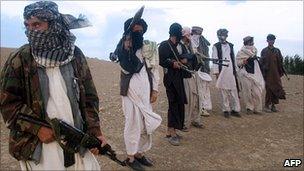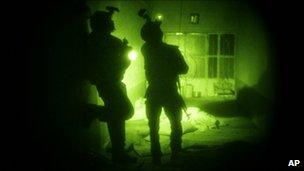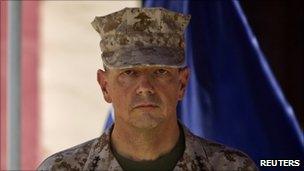Petraeus: Afghan war has turned a corner
- Published
- comments
The outgoing Nato commander in Afghanistan, Gen David Petraeus, speaks to Newsnight's Mark Urban about America's longest war
US relations with Pakistan have started to come "back from the abyss", Gen David Petraeus, the outgoing Nato commander in Afghanistan, tells me.
In his final major interview in that post, Gen Petraeus cites his recent meeting with the head of Pakistan's armed forces and one between intelligence chiefs to argue the two sides have begun to re-build co-operation that has suffered since May, when the US launched a unilateral raid into Pakistan to kill Osama Bin Laden.
Good relations with Pakistan on sensitive counter-terrorist matters clearly rank high with the general as he prepares to take the helm of the Central Intelligence Agency next month.
Among Washington policy makers, Gen Petraeus has acquired the reputation of the man who "saved Iraq" from civil war with a surge of forces and new tactics in 2007-08.
Momentum
The general dismisses suggestions he should run for president, and he is anxious to counter suggestions that he is leaving Afghanistan disappointed not to have brought about the same kind of change in security there.

Gen Petraeus believes factions of the insurgency could be divided
I spoke to Gen Petraeus as he stopped off in London on his way home from Afghanistan. In the interview, he spelled out what makes him think the country has begun to turn a corner after nearly 10 years of war.
The past week saw 20% fewer attacks on Nato forces than the same week last year, and this is the ninth week in which a similar pattern has been apparent, leading him to conclude "it's developing into a trend".
In February, when we met in his Kabul headquarters, he noticeably avoided citing statistics of progress or claiming anything more than to have checked the momentum of the insurgency.
So why does he sound more positive now? How does he respond to fears President Barack Obama's drawdown of US forces beginning this summer could endanger progress because it will proceed faster than the general had recommended?
The general suggested twice as many Afghan forces will join the counter-insurgency effort than the 33,000 Americans due to leave during the next 15 months.
Fighting season
And he said Gen John Allen, his successor, would also have the ability to delay the withdrawal of some of those US troops until autumn 2012 if he believes it is necessary to maintain the pressure on the insurgents during next summer's "fighting season".

There were 2,832 special operations raids between April and July this year
The importance of the summer months as a time for escalating attacks explains both why Gen Petraeus thinks the figures for this June and July are important and why he wants his successor to be able to keep up the pressure next year.
When discussing the drive to negotiate with the leaders of the Afghan insurgency, the general sounds less optimistic about progress than some recent statements from British or American political leaders.
He accepts that different parts of the insurgency, such as the Quetta Shura or the Taliban, the Haqqani Group and Gulbuddin Hekmatyar's Islamic Party, form no more than a loose "syndicate" that could easily fracture if peace overtures with particular factions made progress.
It would be a positive outcome, he says, if those groups would join the process of reconciliation with President Hamid Karzai's government.
In the meantime, special operations raids have been stepped up to an astonishing 2,832 raids between April and July of this year.
"It does have a very disruptive effect on the enemy", Gen Petraeus said, noting that in the province of Badghis the raids may have led some insurgents to switch sides to the government.
'Long war'
He added that 12,000 Afghan special operators have been trained, and they are involved in all missions now since other coalition special units like Delta Force or Britain's Special Boat Service have ceased unilateral operations.

Now General John Allen's beady eye will be on the Taliban
The general's work in Afghanistan and Pakistan is still clearly unfinished business.
While he can point to encouraging trends, they are not as dramatic as the improvement in security in Baghdad four years ago.
As CIA director, Gen Petraeus will clearly remain closely involved with the region and with that organisation's controversial programme of drone strikes in Pakistan.
He insists he has always said - since being sent by the head of the US armed forces in 2005 to conduct a report in Afghanistan - that it would always be the most difficult and drawn out theatre in the "long war".
Since then, he has spent years in the region, fought off cancer and defied those who insisted the US had been defeated in Iraq.
Heading to the CIA after 37 years in the US military, Gen Petraeus has "set the standard for wartime command in the modern era", Admiral Mike Mullen, chairman of the US chiefs of staff, says.
If this summer's trend of a downturn in violence endures, he may also have managed to ease the exit of US troops from Afghanistan as well as Iraq.
Watch my interview with Gen Petraeus in full on Newsnight on Thursday 28 July 2011 at 2230BST on BBC Two (UK only), and then afterwards on the BBC iPlayer (UK only) and Newsnight website.